Reference management. Clean and simple.

The top list of academic search engines

1. Google Scholar
4. science.gov, 5. semantic scholar, 6. baidu scholar, get the most out of academic search engines, frequently asked questions about academic search engines, related articles.
Academic search engines have become the number one resource to turn to in order to find research papers and other scholarly sources. While classic academic databases like Web of Science and Scopus are locked behind paywalls, Google Scholar and others can be accessed free of charge. In order to help you get your research done fast, we have compiled the top list of free academic search engines.
Google Scholar is the clear number one when it comes to academic search engines. It's the power of Google searches applied to research papers and patents. It not only lets you find research papers for all academic disciplines for free but also often provides links to full-text PDF files.
- Coverage: approx. 200 million articles
- Abstracts: only a snippet of the abstract is available
- Related articles: ✔
- References: ✔
- Cited by: ✔
- Links to full text: ✔
- Export formats: APA, MLA, Chicago, Harvard, Vancouver, RIS, BibTeX

BASE is hosted at Bielefeld University in Germany. That is also where its name stems from (Bielefeld Academic Search Engine).
- Coverage: approx. 136 million articles (contains duplicates)
- Abstracts: ✔
- Related articles: ✘
- References: ✘
- Cited by: ✘
- Export formats: RIS, BibTeX

CORE is an academic search engine dedicated to open-access research papers. For each search result, a link to the full-text PDF or full-text web page is provided.
- Coverage: approx. 136 million articles
- Links to full text: ✔ (all articles in CORE are open access)
- Export formats: BibTeX

Science.gov is a fantastic resource as it bundles and offers free access to search results from more than 15 U.S. federal agencies. There is no need anymore to query all those resources separately!
- Coverage: approx. 200 million articles and reports
- Links to full text: ✔ (available for some databases)
- Export formats: APA, MLA, RIS, BibTeX (available for some databases)

Semantic Scholar is the new kid on the block. Its mission is to provide more relevant and impactful search results using AI-powered algorithms that find hidden connections and links between research topics.
- Coverage: approx. 40 million articles
- Export formats: APA, MLA, Chicago, BibTeX

Although Baidu Scholar's interface is in Chinese, its index contains research papers in English as well as Chinese.
- Coverage: no detailed statistics available, approx. 100 million articles
- Abstracts: only snippets of the abstract are available
- Export formats: APA, MLA, RIS, BibTeX

RefSeek searches more than one billion documents from academic and organizational websites. Its clean interface makes it especially easy to use for students and new researchers.
- Coverage: no detailed statistics available, approx. 1 billion documents
- Abstracts: only snippets of the article are available
- Export formats: not available

Consider using a reference manager like Paperpile to save, organize, and cite your references. Paperpile integrates with Google Scholar and many popular databases, so you can save references and PDFs directly to your library using the Paperpile buttons:

Google Scholar is an academic search engine, and it is the clear number one when it comes to academic search engines. It's the power of Google searches applied to research papers and patents. It not only let's you find research papers for all academic disciplines for free, but also often provides links to full text PDF file.
Semantic Scholar is a free, AI-powered research tool for scientific literature developed at the Allen Institute for AI. Sematic Scholar was publicly released in 2015 and uses advances in natural language processing to provide summaries for scholarly papers.
BASE , as its name suggest is an academic search engine. It is hosted at Bielefeld University in Germany and that's where it name stems from (Bielefeld Academic Search Engine).
CORE is an academic search engine dedicated to open access research papers. For each search result a link to the full text PDF or full text web page is provided.
Science.gov is a fantastic resource as it bundles and offers free access to search results from more than 15 U.S. federal agencies. There is no need any more to query all those resources separately!
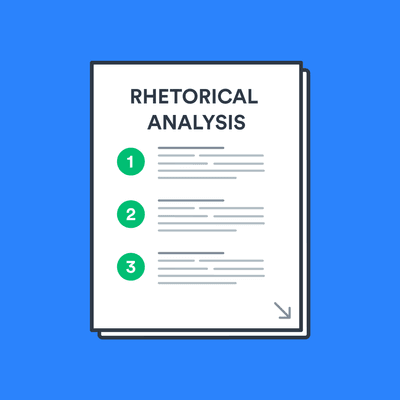

10 Best Literature Review Tools for Researchers
This post may contain affiliate links that allow us to earn a commission at no expense to you. Learn more

Boost your research game with these Best Literature Review Tools for Researchers! Uncover hidden gems, organize your findings, and ace your next research paper!
Conducting literature reviews poses challenges for researchers due to the overwhelming volume of information available and the lack of efficient methods to manage and analyze it.
Researchers struggle to identify key sources, extract relevant information, and maintain accuracy while manually conducting literature reviews. This leads to inefficiency, errors, and difficulty in identifying gaps or trends in existing literature.
Advancements in technology have resulted in a variety of literature review tools. These tools streamline the process, offering features like automated searching, filtering, citation management, and research data extraction. They save time, improve accuracy, and provide valuable insights for researchers.
In this article, we present a curated list of the 10 best literature review tools, empowering researchers to make informed choices and revolutionize their systematic literature review process.
Table of Contents
Top 10 Literature Review Tools for Researchers: In A Nutshell (2023)
#1. semantic scholar – a free, ai-powered research tool for scientific literature.
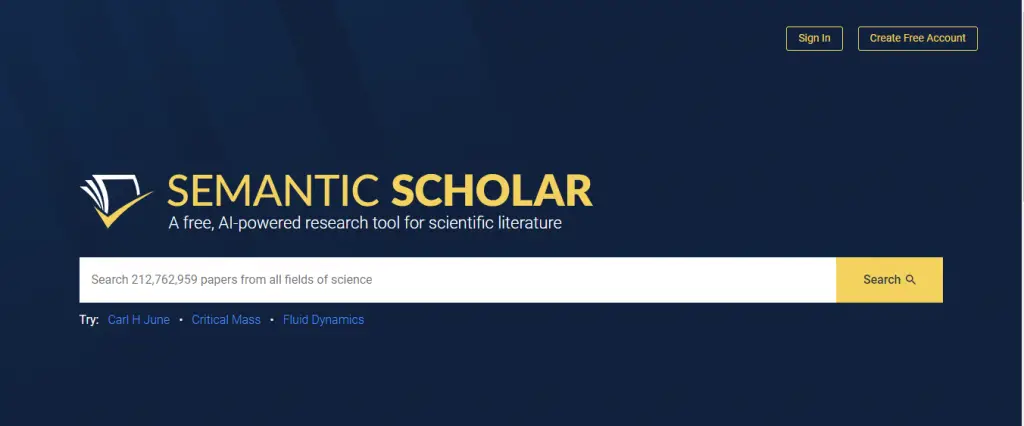
Semantic Scholar is a cutting-edge literature review tool that researchers rely on for its comprehensive access to academic publications. With its advanced AI algorithms and extensive database, it simplifies the discovery of relevant research papers.
By employing semantic analysis, users can explore scholarly articles based on context and meaning, making it a go-to resource for scholars across disciplines.
Additionally, Semantic Scholar offers personalized recommendations and alerts, ensuring researchers stay updated with the latest developments. However, users should be cautious of potential limitations.
Not all scholarly content may be indexed, and occasional false positives or inaccurate associations can occur. Furthermore, the tool primarily focuses on computer science and related fields, potentially limiting coverage in other disciplines.
Researchers should be mindful of these considerations and supplement Semantic Scholar with other reputable resources for a comprehensive literature review. Despite these caveats, Semantic Scholar remains a valuable tool for streamlining research and staying informed.
#2. Elicit – Research assistant using language models like GPT-3
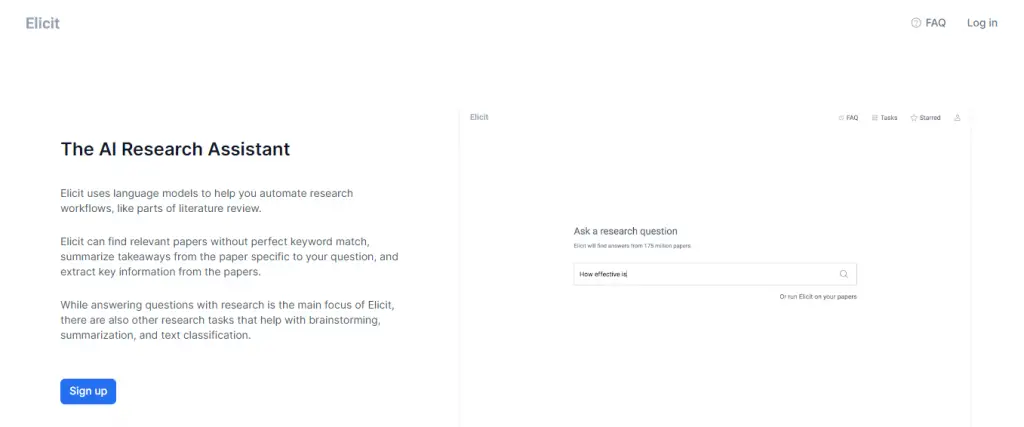
Elicit is a game-changing literature review tool that has gained popularity among researchers worldwide. With its user-friendly interface and extensive database of scholarly articles, it streamlines the research process, saving time and effort.
The tool employs advanced algorithms to provide personalized recommendations, ensuring researchers discover the most relevant studies for their field. Elicit also promotes collaboration by enabling users to create shared folders and annotate articles.
However, users should be cautious when using Elicit. It is important to verify the credibility and accuracy of the sources found through the tool, as the database encompasses a wide range of publications.
Additionally, occasional glitches in the search function have been reported, leading to incomplete or inaccurate results. While Elicit offers tremendous benefits, researchers should remain vigilant and cross-reference information to ensure a comprehensive literature review.
#3. Scite.Ai – Your personal research assistant
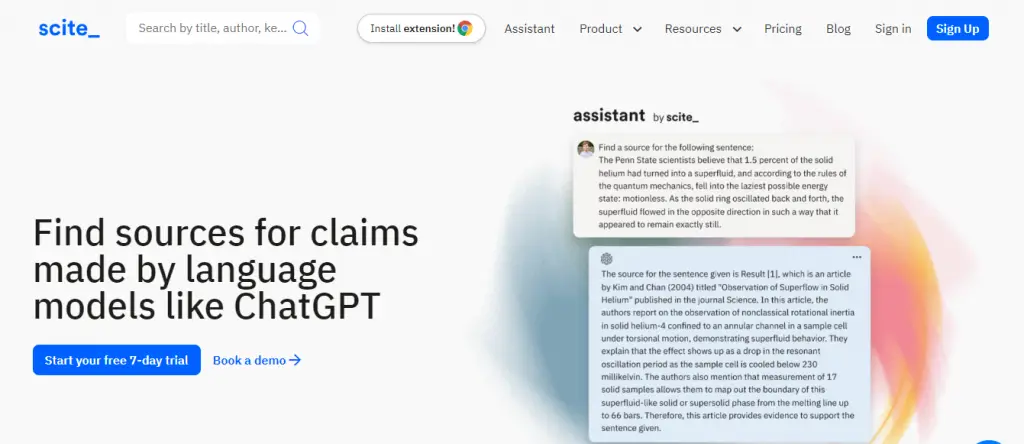
Scite.Ai is a popular literature review tool that revolutionizes the research process for scholars. With its innovative citation analysis feature, researchers can evaluate the credibility and impact of scientific articles, making informed decisions about their inclusion in their own work.
By assessing the context in which citations are used, Scite.Ai ensures that the sources selected are reliable and of high quality, enabling researchers to establish a strong foundation for their research.
However, while Scite.Ai offers numerous advantages, there are a few aspects to be cautious about. As with any data-driven tool, occasional errors or inaccuracies may arise, necessitating researchers to cross-reference and verify results with other reputable sources.
Moreover, Scite.Ai’s coverage may be limited in certain subject areas and languages, with a possibility of missing relevant studies, especially in niche fields or non-English publications.
Therefore, researchers should supplement the use of Scite.Ai with additional resources to ensure comprehensive literature coverage and avoid any potential gaps in their research.
Rayyan offers the following paid plans:
- Monthly Plan: $20
- Yearly Plan: $12
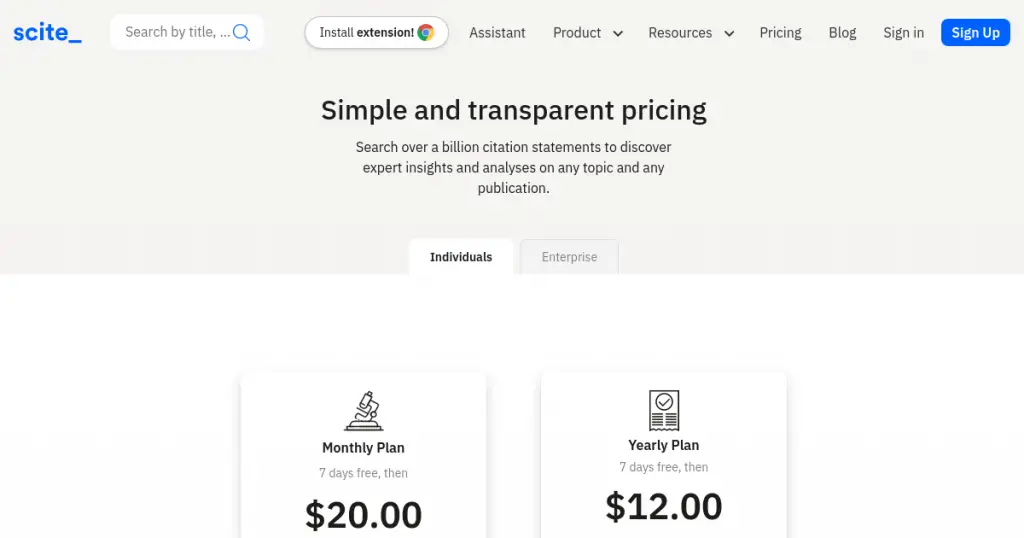
#4. DistillerSR – Literature Review Software
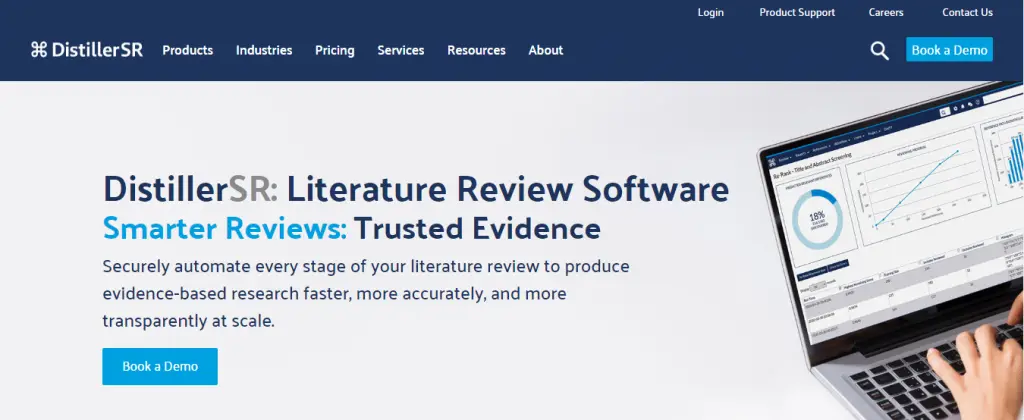
DistillerSR is a powerful literature review tool trusted by researchers for its user-friendly interface and robust features. With its advanced search capabilities, researchers can quickly find relevant studies from multiple databases, saving time and effort.
The tool offers comprehensive screening and data extraction functionalities, streamlining the review process and improving the reliability of findings. Real-time collaboration features also facilitate seamless teamwork among researchers.
While DistillerSR offers numerous advantages, there are a few considerations. Users should invest time in understanding the tool’s features and functionalities to maximize its potential. Additionally, the pricing structure may be a factor for individual researchers or small teams with limited budgets.
Despite occasional technical glitches reported by some users, the developers actively address these issues through updates and improvements, ensuring a better user experience.
Overall, DistillerSR empowers researchers to navigate the vast sea of information, enhancing the quality and efficiency of literature reviews while fostering collaboration among research teams .
#5. Rayyan – AI Powered Tool for Systematic Literature Reviews
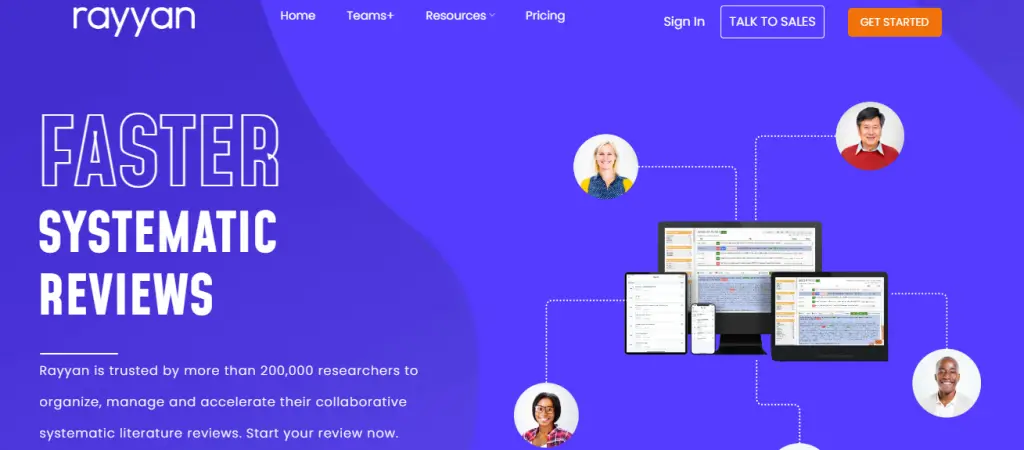
Rayyan is a powerful literature review tool that simplifies the research process for scholars and academics. With its user-friendly interface and efficient management features, Rayyan is highly regarded by researchers worldwide.
It allows users to import and organize large volumes of scholarly articles, making it easier to identify relevant studies for their research projects. The tool also facilitates seamless collaboration among team members, enhancing productivity and streamlining the research workflow.
However, it’s important to be aware of a few aspects. The free version of Rayyan has limitations, and upgrading to a premium subscription may be necessary for additional functionalities.
Users should also be mindful of occasional technical glitches and compatibility issues, promptly reporting any problems. Despite these considerations, Rayyan remains a valuable asset for researchers, providing an effective solution for literature review tasks.
Rayyan offers both free and paid plans:
- Professional: $8.25/month
- Student: $4/month
- Pro Team: $8.25/month
- Team+: $24.99/month
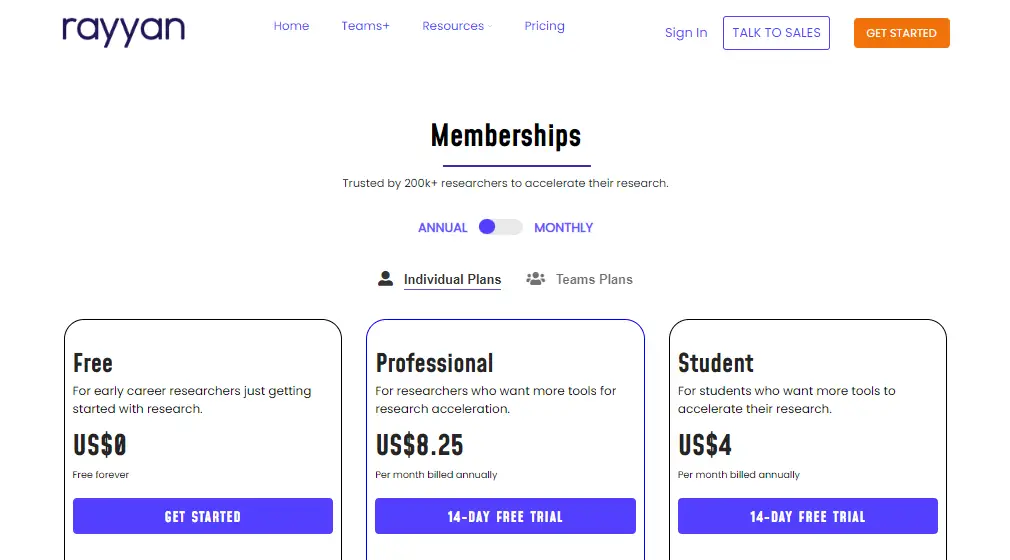
#6. Consensus – Use AI to find you answers in scientific research
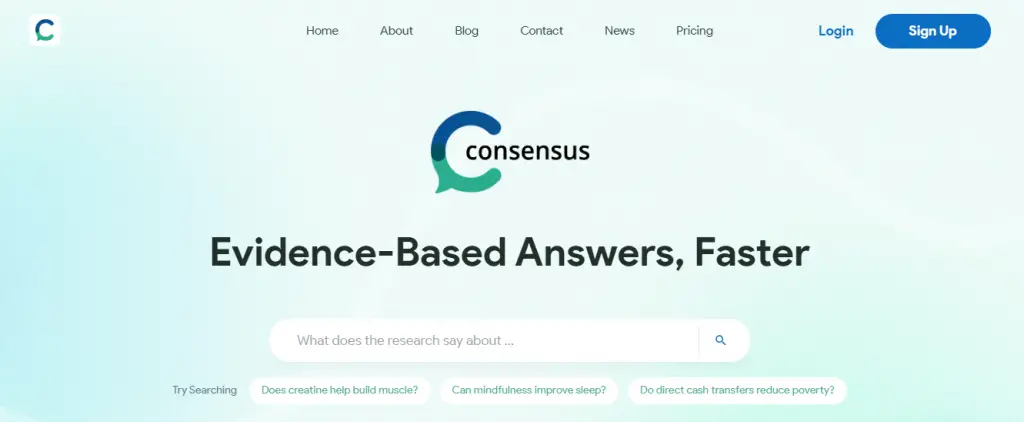
Consensus is a cutting-edge literature review tool that has become a go-to choice for researchers worldwide. Its intuitive interface and powerful capabilities make it a preferred tool for navigating and analyzing scholarly articles.
With Consensus, researchers can save significant time by efficiently organizing and accessing relevant research material.People consider Consensus for several reasons.
Its advanced search algorithms and filters help researchers sift through vast amounts of information, ensuring they focus on the most relevant articles. By streamlining the literature review process, Consensus allows researchers to extract valuable insights and accelerate their research progress.
However, there are a few factors to watch out for when using Consensus. As with any automated tool, researchers should exercise caution and independently verify the accuracy and relevance of the generated results. Complex or niche topics may present challenges, resulting in limited search results. Researchers should also supplement Consensus with manual searches to ensure comprehensive coverage of the literature.
Overall, Consensus is a valuable resource for researchers seeking to optimize their literature review process. By leveraging its features alongside critical thinking and manual searches, researchers can enhance the efficiency and effectiveness of their work, advancing their research endeavors to new heights.
Consensus offers both free and paid plans:
- Premium: $9.99/month
- Enterprise: Custom
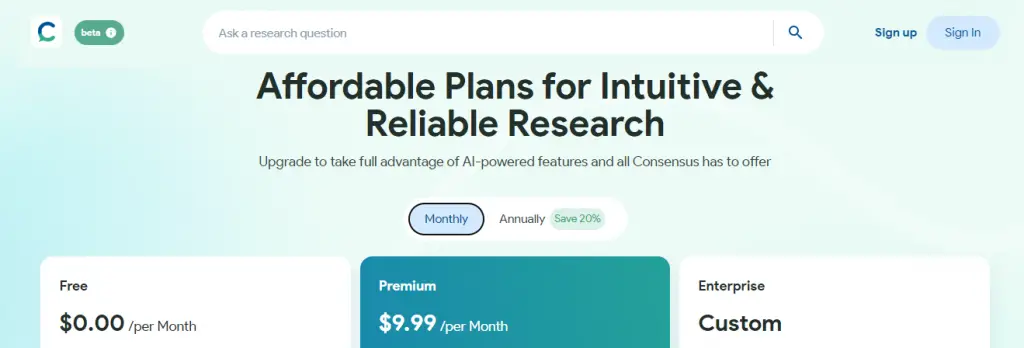
#7. RAx – AI-powered reading assistant
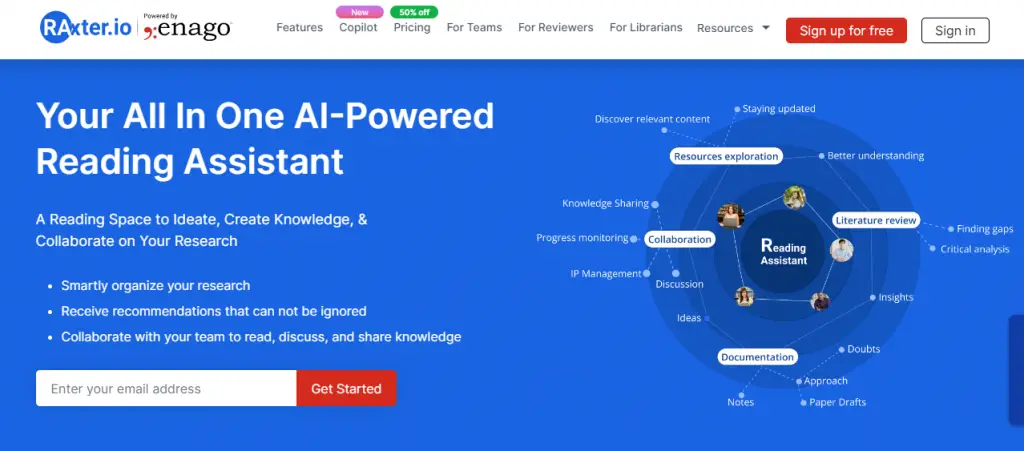
Consensus is a revolutionary literature review tool that has transformed the research process for scholars worldwide. With its user-friendly interface and advanced features, it offers a vast database of academic publications across various disciplines, providing access to relevant and up-to-date literature.
Using advanced algorithms and machine learning, Consensus delivers personalized recommendations, saving researchers time and effort in their literature search.
However, researchers should be cautious of potential biases in the recommendation system and supplement their search with manual verification to ensure a comprehensive review.
Additionally, occasional inaccuracies in metadata have been reported, making it essential for users to cross-reference information with reliable sources. Despite these considerations, Consensus remains an invaluable tool for enhancing the efficiency and quality of literature reviews.
RAx offers both free and paid plans. Currently offering 50% discounts as of July 2023:
- Premium: $6/month $3/month
- Premium with Copilot: $8/month $4/month
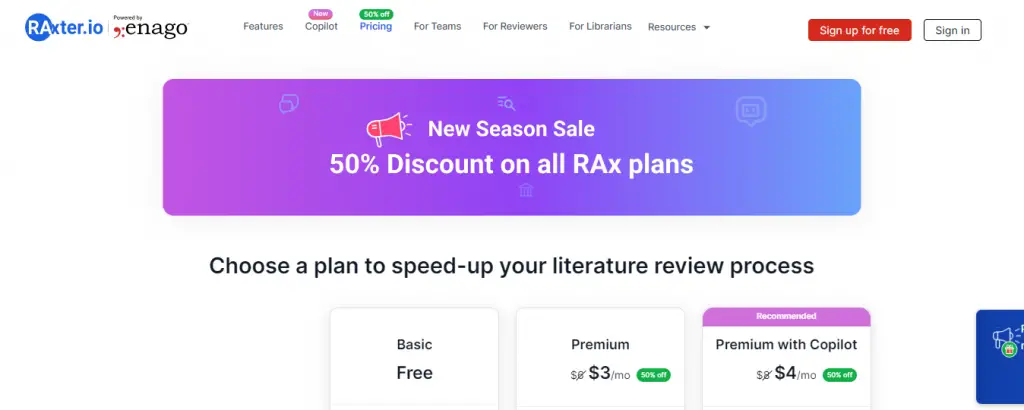
#8. Lateral – Advance your research with AI
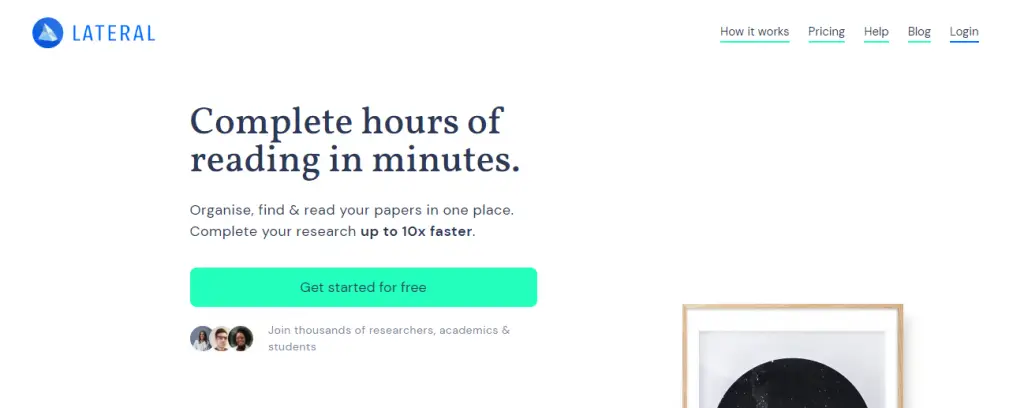
“Lateral” is a revolutionary literature review tool trusted by researchers worldwide. With its user-friendly interface and powerful search capabilities, it simplifies the process of gathering and analyzing scholarly articles.
By leveraging advanced algorithms and machine learning, Lateral saves researchers precious time by retrieving relevant articles and uncovering new connections between them, fostering interdisciplinary exploration.
While Lateral provides numerous benefits, users should exercise caution. It is advisable to cross-reference its findings with other sources to ensure a comprehensive review.
Additionally, researchers must be mindful of potential biases introduced by the tool’s algorithms and should critically evaluate and interpret the results.
Despite these considerations, Lateral remains an indispensable resource, empowering researchers to delve deeper into their fields of study and make valuable contributions to the academic community.
RAx offers both free and paid plans:
- Premium: $10.98
- Pro: $27.46
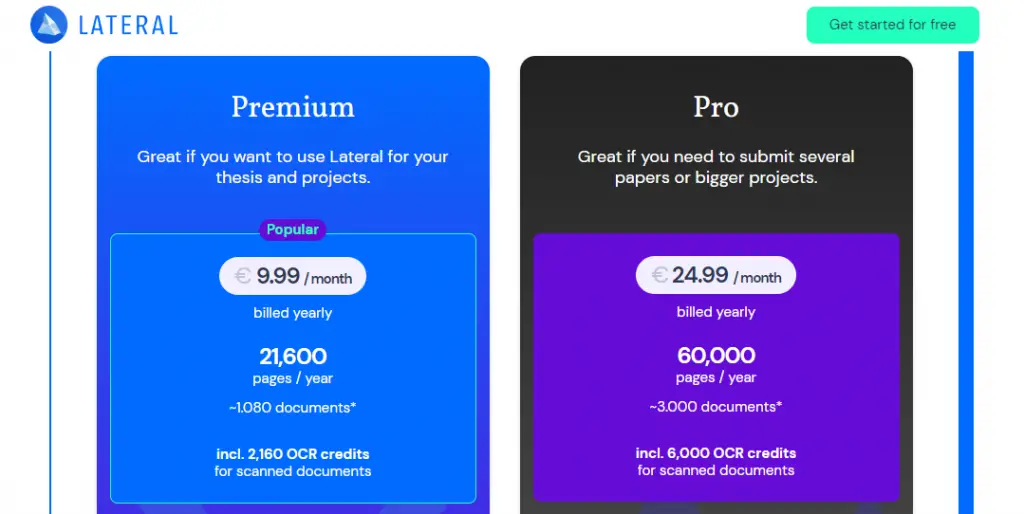
#9. Iris AI – Introducing the researcher workspace
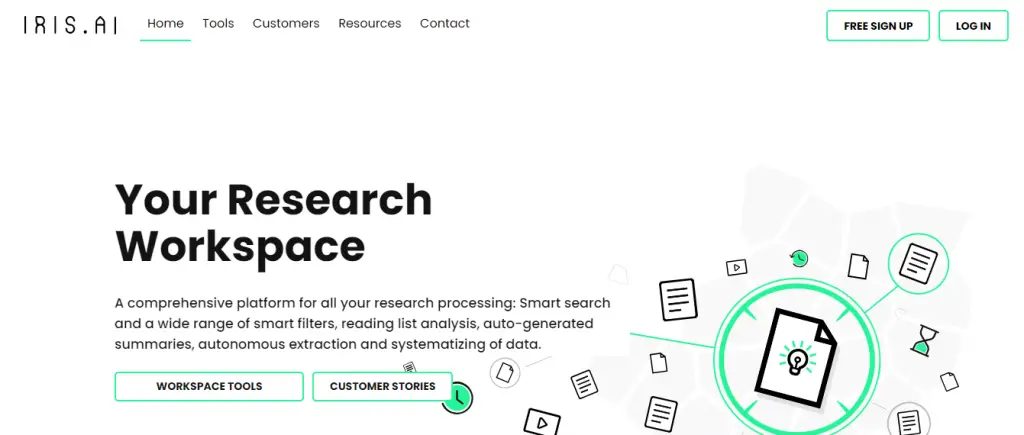
Iris AI is an innovative literature review tool that has transformed the research process for academics and scholars. With its advanced artificial intelligence capabilities, Iris AI offers a seamless and efficient way to navigate through a vast array of academic papers and publications.
Researchers are drawn to this tool because it saves valuable time by automating the tedious task of literature review and provides comprehensive coverage across multiple disciplines.
Its intelligent recommendation system suggests related articles, enabling researchers to discover hidden connections and broaden their knowledge base. However, caution should be exercised while using Iris AI.
While the tool excels at surfacing relevant papers, researchers should independently evaluate the quality and validity of the sources to ensure the reliability of their work.
It’s important to note that Iris AI may occasionally miss niche or lesser-known publications, necessitating a supplementary search using traditional methods.
Additionally, being an algorithm-based tool, there is a possibility of false positives or missed relevant articles due to the inherent limitations of automated text analysis. Nevertheless, Iris AI remains an invaluable asset for researchers, enhancing the quality and efficiency of their research endeavors.
Iris AI offers different pricing plans to cater to various user needs:
- Basic: Free
- Premium: Monthly ($82.41), Quarterly ($222.49), and Annual ($791.07)
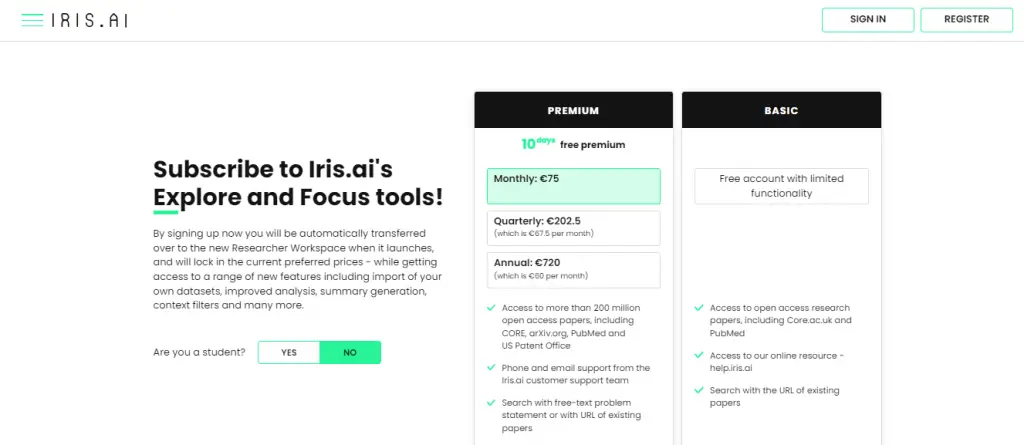
#10. Scholarcy – Summarize your literature through AI
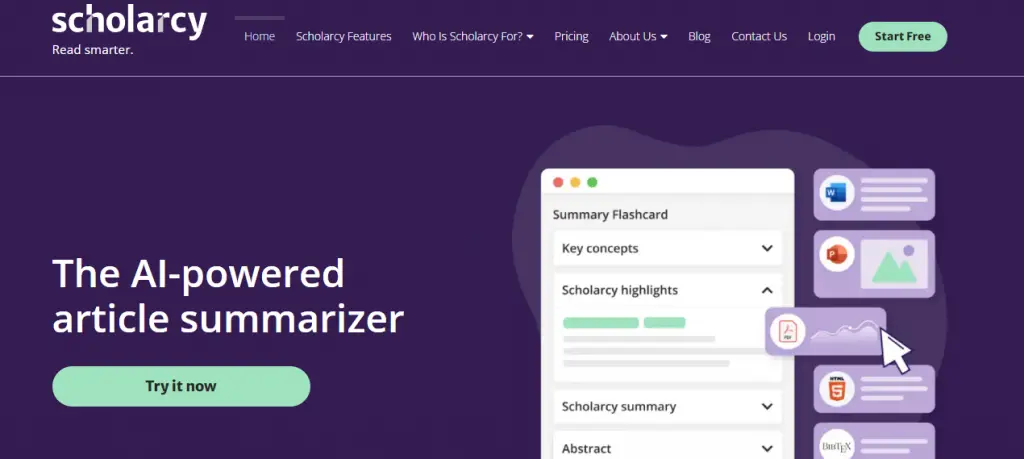
Scholarcy is a powerful literature review tool that helps researchers streamline their work. By employing advanced algorithms and natural language processing, it efficiently analyzes and summarizes academic papers, saving researchers valuable time.
Scholarcy’s ability to extract key information and generate concise summaries makes it an attractive option for scholars looking to quickly grasp the main concepts and findings of multiple papers.
However, it is important to exercise caution when relying solely on Scholarcy. While it provides a useful starting point, engaging with the original research papers is crucial to ensure a comprehensive understanding.
Scholarcy’s automated summarization may not capture the nuanced interpretations or contextual information presented in the full text.
Researchers should also be aware that certain types of documents, particularly those with heavy mathematical or technical content, may pose challenges for the tool.
Despite these considerations, Scholarcy remains a valuable resource for researchers seeking to enhance their literature review process and improve overall efficiency.
Scholarcy offer the following pricing plans:
- Browser Extension and Flashcards: Free
- Personal Library: $9.99
- Academic Institution License: $8K+

Final Thoughts
In conclusion, conducting a comprehensive literature review is a crucial aspect of any research project, and the availability of reliable and efficient tools can greatly facilitate this process for researchers. This article has explored the top 10 literature review tools that have gained popularity among researchers.
Moreover, the rise of AI-powered tools like Iris.ai and Sci.ai promises to revolutionize the literature review process by automating various tasks and enhancing research efficiency.
Ultimately, the choice of literature review tool depends on individual preferences and research needs, but the tools presented in this article serve as valuable resources to enhance the quality and productivity of research endeavors.
Researchers are encouraged to explore and utilize these tools to stay at the forefront of knowledge in their respective fields and contribute to the advancement of science and academia.
Q1. What are literature review tools for researchers?
Literature review tools for researchers are software or online platforms designed to assist researchers in efficiently conducting literature reviews. These tools help researchers find, organize, analyze, and synthesize relevant academic papers and other sources of information.
Q2. What criteria should researchers consider when choosing literature review tools?
When choosing literature review tools, researchers should consider factors such as the tool’s search capabilities, database coverage, user interface, collaboration features, citation management, annotation and highlighting options, integration with reference management software, and data extraction capabilities.
It’s also essential to consider the tool’s accessibility, cost, and technical support.
Q3. Are there any literature review tools specifically designed for systematic reviews or meta-analyses?
Yes, there are literature review tools that cater specifically to systematic reviews and meta-analyses, which involve a rigorous and structured approach to reviewing existing literature. These tools often provide features tailored to the specific needs of these methodologies, such as:
Screening and eligibility assessment: Systematic review tools typically offer functionalities for screening and assessing the eligibility of studies based on predefined inclusion and exclusion criteria. This streamlines the process of selecting relevant studies for analysis.
Data extraction and quality assessment: These tools often include templates and forms to facilitate data extraction from selected studies. Additionally, they may provide features for assessing the quality and risk of bias in individual studies.
Meta-analysis support: Some literature review tools include statistical analysis features that assist in conducting meta-analyses. These features can help calculate effect sizes, perform statistical tests, and generate forest plots or other visual representations of the meta-analytic results.
Reporting assistance: Many tools provide templates or frameworks for generating systematic review reports, ensuring compliance with established guidelines such as PRISMA (Preferred Reporting Items for Systematic Reviews and Meta-Analyses).
Q4. Can literature review tools help with organizing and annotating collected references?
Yes, literature review tools often come equipped with features to help researchers organize and annotate collected references. Some common functionalities include:
Reference management: These tools enable researchers to import references from various sources, such as databases or PDF files, and store them in a central library. They typically allow you to create folders or tags to organize references based on themes or categories.
Annotation capabilities: Many tools provide options for adding annotations, comments, or tags to individual references or specific sections of research articles. This helps researchers keep track of important information, highlight key findings, or note potential connections between different sources.
Full-text search: Literature review tools often offer full-text search functionality, allowing you to search within the content of imported articles or documents. This can be particularly useful when you need to locate specific information or keywords across multiple references.
Integration with citation managers: Some literature review tools integrate with popular citation managers like Zotero, Mendeley, or EndNote, allowing seamless transfer of references and annotations between platforms.
By leveraging these features, researchers can streamline the organization and annotation of their collected references, making it easier to retrieve relevant information during the literature review process.
Leave a Comment Cancel reply
Save my name, email, and website in this browser for the next time I comment.
We maintain and update science journals and scientific metrics. Scientific metrics data are aggregated from publicly available sources. Please note that we do NOT publish research papers on this platform. We do NOT accept any manuscript.
2012-2024 © scijournal.org

Websites for Review Related Literature (RRL) 2024
Last Updated:
- Share on Facebook
- Share on WhatsApp
When conducting research, writing a thesis, or preparing a dissertation, it is crucial to find credible and relevant sources for your Review Related Literature.
The following list provides valuable Websites for Review Related Literature to help you gather the necessary references for your academic work.
Table of Contents
Stay Updated! Join our community
Top 19 Websites for Review Related Literature:
Finding reliable and relevant literature is crucial for any research project. To assist you in this process, we’ve compiled a list of the top 19 websites for review related literature.
These platforms provide comprehensive reviews and access to a wide range of academic and scholarly resources, helping you stay informed and gather valuable insights for your literature review.
Springer Link

Description: Provides access to millions of scientific documents from journals, books, series, protocols, and reference works in various fields.
Short Summary: Ideal for comprehensive research across multiple disciplines, offering extensive scientific and academic resources.
Example: Searching for articles on “machine learning in healthcare.”
URL: https://link.springer.com/
Steps: Enter “machine learning in healthcare” in the search bar and browse through the available journal articles, books, and conference papers.
ERIC (Education Resources Information Center)

Description: Sponsored by the Institute of Education Sciences, ERIC is an online digital library of education research and information.
Short Summary: Focuses on education-related research, providing access to a wealth of resources on various educational topics.
Example: Finding research papers on “inclusive education practices.”
URL: http://eric.ed.gov
Steps: Search for “inclusive education practices” and filter the results by peer-reviewed articles, publication date, and source.
Google Scholar

Description: Google Scholar is a free search engine that indexes the full text or metadata of scholarly literature across an array of publishing formats and disciplines.
Short Summary: A broad search tool for accessing scholarly articles, theses, books, and conference papers across diverse fields.
Example: Looking up studies on “climate change adaptation strategies.”
URL: http://scholar.google.com
Steps: Type “climate change adaptation strategies” in the search bar and review the scholarly articles, theses, books, and conference papers that appear.

Description: PDFDrive offers direct downloads of books and research papers in PDF format across various disciplines.
Short Summary: Provides free access to downloadable PDFs of books and research papers, suitable for in-depth study.
Example: Downloading a PDF book on “quantitative research methods.”
URL: https://www.pdfdrive.com/
Steps: Search for “quantitative research methods” and download the available PDF books related to your topic.
Global ETD Search

Description: This search engine provides access to electronic theses and dissertations (ETDs) from institutions around the world.
Short Summary: Facilitates access to electronic theses and dissertations, valuable for reviewing comprehensive research projects.
Example: Accessing theses on “renewable energy technologies.”
URL: http://search.ndltd.org/index.php
Steps: Enter “renewable energy technologies” into the search bar and access the available electronic theses and dissertations.

Description: Infotopia is a research engine for students, offering information and archives on art, history, social sciences, and community issues.
Short Summary: A student-friendly resource for exploring a wide range of topics, including art, history, and social sciences.
Example: Researching “historical perspectives on social movements.”
URL: http://infotopia.info
Steps: Search for “historical perspectives on social movements” and explore the curated academic resources and websites.

Description: Theses.fr is a comprehensive database of theses and journals for students and researchers.
Short Summary: Specializes in French theses and journals, providing valuable resources for academic research in various fields.
Example: Finding French theses on “artificial intelligence ethics.”
URL: https://www.theses.fr/
Steps: Enter “artificial intelligence ethics” in the search bar to find relevant French doctoral theses and research papers.
Directory of Open Access Journals (DOAJ)

Description: DOAJ is a community-curated online directory that indexes and provides access to high-quality, open-access, peer-reviewed journals.
Short Summary: Offers access to open-access journals across various fields, promoting high-quality and freely available academic content.
Example: Accessing open access journals on “public health.”
URL: http://doaj.org
Steps: Search for “public health” and filter results to find peer-reviewed open access journal articles.
OhioLINK Electronic Theses & Dissertations Center

Description: OhioLINK provides access to Master’s and Ph.D. theses from students in Ohio, which you can read and download.
Short Summary: Allows access to a wide range of theses and dissertations from Ohio institutions, useful for comprehensive research.
Example: Reading a dissertation on “urban planning and sustainability.”
URL: https://etd.ohiolink.edu/apexprod/rws_olink/r/1501/1
Steps: Enter “urban planning and sustainability” in the search bar and browse through the available theses and dissertations.
Lib Guides Community

Description: LibGuides Community offers research guides created by librarians from around the world, providing an organized collection of information and resources.
Short Summary: Features research guides on various topics curated by librarians, making it easier to find relevant academic resources.
Example: Using research guides on “nursing practices.”
URL: https://community.libguides.com/
Steps: Search for “nursing practices” and use the research guides provided by librarians to find relevant information and resources.
BASE (Bielefeld Academic Search Engine)

Description: BASE is a search engine for academic web resources, maintained by the Bielefeld University Library in Germany.
Short Summary: A search engine for academic web resources, offering access to open access documents from various disciplines.
Example: Finding open access papers on “environmental science.”
URL: http://base-search.net
Steps: Type “environmental science” in the search bar and explore the open access academic sources available.

Description: Refseek is a search engine for students and researchers that focuses on web pages, books, encyclopedias, journals, and newspapers.
Short Summary: Provides a focused search for academic content, including web pages, books, and scholarly articles.
Example: Researching “psychological effects of social media.”
URL: http://refseek.com
Steps: Enter “psychological effects of social media” and browse through academic websites, books, and journals.
The Virtual Learning Resources Center (LRC)

Description: The Virtual LRC indexes thousands of academic information websites, providing access to information across various fields.
Short Summary: Offers a wide array of academic resources and information across different disciplines.
Example: Accessing information on “global economic trends.”
URL: http://virtuallrc.com
Steps: Search for “global economic trends” to access a curated collection of academic websites and resources.
SweetSearch

Description: SweetSearch is a search engine for students, emphasizing credible, academic content.
Short Summary: Designed for students, it focuses on providing credible and academic resources.
Example: Finding credible sources on “educational technology.”
URL: http://sweetsearch.com
Steps: Type “educational technology” in the search bar and explore the academic content specifically tailored for students.

Description: DeepDyve is a rental service for scientific and scholarly research articles, offering access to thousands of journals.
Short Summary: Allows renting of scientific and scholarly articles, providing access to extensive research materials.
Example: Renting an article on “genetic engineering.”
URL: https://www.deepdyve.com
Steps: Search for “genetic engineering” and rent the relevant scholarly articles you need for your research.
Library Genesis (LibGen)

Description: LibGen is a search engine for free access to millions of academic articles, books, and research papers.
Short Summary: Provides free access to a vast collection of academic articles, books, and research papers.
Example: Downloading research papers on “artificial intelligence.”
URL : https://libgen.rs/
Steps: Enter “artificial intelligence” in the search bar and download the research papers available.
Project Gutenberg

Description: Project Gutenberg offers over 60,000 free eBooks, including many classic literature works and academic texts.
Short Summary: Offers free access to a wide range of eBooks, including classic literature and academic texts.
Example: Accessing classic literature on “psychology.”
URL: https://www.gutenberg.org/
Steps: Search for “psychology” to find and download classic literature and academic texts.
ResearchGate

Description: A global professional network and platform for researchers and scientists to share their publications, ask questions, and collaborate on scientific research.
Short Summary: Provides access to millions of research papers, allowing users to connect with other researchers, share findings, and explore diverse fields of study.
Example: Finding research articles on environmental science or engaging with peers on collaborative studies.
URL: https://www.researchgate.net/
Steps: Sign up for an account, search for specific research topics, connect with researchers in your field, and download available papers or request full-text access from the authors.

Description: A free online platform that aggregates open access research papers from repositories and journals around the world, helping researchers easily find scholarly articles.
Short Summary: Offers millions of research articles from a wide range of disciplines, providing access to open-access papers for academic study and research.
Example: Finding open-access research on climate change or social sciences.
URL: https://core.ac.uk/
Steps: Use the search function to explore research articles on your topic of interest, filter by field or repository, and download available papers for free access.
Final Thoughts on Review Related Literature
When conducting your Review Related Literature , utilizing these diverse and comprehensive research databases can significantly enhance the quality and depth of your research.
Each site offers unique advantages, from accessing peer-reviewed journals and theses to finding open-access papers and classic literature.
Additionally, these websites offer information, you can also browse for scholarship programs and Local-Related Studies and Literature , which can support your academic endeavors.
Explore these resources to gather valuable references and opportunities for funding your studies effectively.
Arvie Montesor
Hey there! I’m Arvie Montesor, part of the PhilScholar team. I’m all about helping writers and exploring cool tech stuff. I got into writing back in school, and now I’m here, diving into different topics and sharing what I learn. At PhilScholar, I write about writing tips, cool tools, and how technology is changing education. But that’s not all! I also keep an eye out for scholarship opportunities, because I believe everyone should have a chance to reach their academic goals.
33 responses to “Websites for Review Related Literature (RRL) 2024”
Hoping Po sana mapili sa schoolar Po Kase need Po wlang saktong budget sa school sa totoo lang dinasana ako mag aaral Kase kulang sa pang bili nang mga gamit at sa bayarin Po school
Product quality and Customer Satisfaction in Public Market Vegetable Section in Kingking, Pantukan, Davao de Oro
I don’t know
Rrl of labong atchara
Preliminary about Assessing the Link between Attitude and English Proficiency among Grade 12 TVL Students. That has already used
Preliminary about Assessing the Link between Attitude and English Proficiency among Grade 12 TVLStudents. That has already used
VARIETAL PERFORMANCE OF INBRED LOWLAND RICE (Oryza sativa) AS INFLUENCED BY MADRE DE CACAO LEAVES (Gliricia sepuim) AS SOIL AMENDMENT
Thank you for the feedback, do you have any suggestions in mind?
“THE LEVEL OF CONFIDENCE IN CLASS PARTICIPATION AMONG STUDENT”
Student Absenteeism how it affect to academic performance of the student
Hello! Can you help me to find RRL for my thesis?
hello help me
hi how are you, how can we help you?
it was amazing
I’m glad you find it amazing, is there any suggestion you would like to share?
the relationship between facebook usage and academic performance in grade 11 students in philsaga high school foundation, inc.
Hello! Ma’am Rosechell,
Good day! Thank you for the comment we appreciate it very much.
Meron po akong hinahanap na RRL about sa thesis namin hindi ko mahanap hanap 😭
You can try to access our another list guide for Local RRL using our search bar type “Local Review Related Literature”
Hope this help, Any assistance you need just comment here again.
“Effectiveness of practical research seminar to the research knowledge, skills and attitude among grade 12 shs students”
15- RRL( 10 years ago)
Analysis of the Relationship Between Financial Problem in Academic Performance among TVL HE Students of RNHS
Thank you for sharing your research topic! If you want to discuss it further or publish it here, feel free to share your thoughts. We appreciate your contribution to the conversation. If you need assistance, we’ll try to see if we can be of help
I need to know the related literature of my research.
To find related literature for your research, you can start by looking for academic journals, books, and online databases related to your topic. Websites similar to what’s listed here are good for RRL, which are for reviewing related literature. RRL helps to provide context, support your arguments, and show gaps in existing research. However, you need to give them a try as this post is a compilation only.
If you need specific sources or guidance, feel free to share more details about your research, and I’d be happy to help
Sir arvie,nag message po ako sa fb nyo, sana po matulungan nyo ako na makahanap ng rrl abt sa Effectiveness of project based learning on developing critical thinking and problem solving skills among elementary learners
Leave a Reply Cancel reply
Your email address will not be published. Required fields are marked *
Save my name, email, and website in this browser for the next time I comment.
Top 10 Best Academic Search Engines for Scholarly Articles in 2025
Jc Chaithanya
14 min read
Best Search Engines to Search for Scientific Papers at a Glance
Top 10 best search engines to search for scientific papers, google scholar key features , google scholar reviews , base key features , base reviews , scispace key features, scispace reviews , core key features , core reviews , scopus key features , scopus reviews, pubmed key features , pubmed reviews , jstor key features , jstor reviews , science.gov key features , science.gov reviews , semantic scholar key features , semantic scholar reviews , baidu scholar key features , baidu scholar reviews , our selection criteria to pick search engines for search for scientific papers, how to choose the best search engine to search for scientific papers, elephas: the research assistant that halves your research time, conclusion , 1. where can i search for scientific papers, 2. how do you search for scientific papers effectively, 3. how to find research papers on google.
Research is the cornerstone of scientific discovery. However, sifting through the vast amount of scholarly literature can feel overwhelming. Fear not, intrepid researchers! Today, we will equip you with the top 10 search engines designed specifically to streamline your search for scientific papers.
We'll delve into the strengths of each platform, helping you identify the perfect tool for your specific research needs. Whether you're seeking a broad overview or a deep dive into a niche topic, our analysis will ensure you learn about the most relevant and reliable search engines to propel your research forward.
To further maximize your research efficiency, we'll also introduce you to Elephas, a powerful AI writing assistant that can revolutionize your research paper writing process. However, we'll save that discussion for later in our article. For now, let's delve into the best search engines to search for scientific papers.
Google Scholar: General search for scholarly literature across various disciplines.
BASE: Free search engine for scholarly articles with summaries and full-text links.
SciSpace: Powerful search engine with AI-powered recommendations for related research.
CORE: User-friendly search engine for open-access scholarly publications.
Scopus: Search engine for high-quality, peer-reviewed scientific publications.
PubMed: Free search engine for biomedical and life sciences literature.
JSTOR: Comprehensive digital library for scholarly articles, ebooks, and primary sources across disciplines.
Science.gov: Free search engine for scientific research from US government agencies.
Semantic Scholar: Uses AI to find relevant research papers and uncover hidden connections.
Baidu Scholar: Search engine for academic literature in Chinese
1. Google Scholar

Google Scholar simplifies searching for scholarly literature. It crawls millions of academic publications across various disciplines, including articles, theses, books, and conference papers. Researchers can set up alerts to stay updated on new publications in their field. Google Scholar is like Google Search but specifically designed for academic research.
Massive Database: Search roughly 200 million scholarly articles.
Find Freely Available Papers: Locate research papers and often access full PDFs.
Stay Updated: Set alerts for new publications in your field.
Explore Research: Discover related articles, references, and citations.
Easy Citation Management: Export citations in various formats.
Formatting: Easily export your search results into common citation formats like APA and MLA.
We could not find any public reviews on Google Scholar, so we advise users to stay cautious when using the search engine.
2. Base

BASE (Bielefeld Academic Search Engine) is a free search engine specializing in scholarly articles. With over 136 million publications (including duplicates), BASE allows you to search for research papers across various disciplines. It provides summaries and links to full text whenever available. While BASE doesn't offer features like finding related articles, cited references, or who cited the paper, it excels in its core function: searching for scientific publications effortlessly.
Free Search Engine: Access millions of scholarly publications without any cost.
Focus on Academic Content: Search a vast collection of research papers across various fields.
Article Summaries: Quickly grasp the research topic with summaries (abstracts) provided for each article.
Full Text Links: When available, access the full scientific paper directly through BASE.
Simple Interface: Navigate BASE's user-friendly interface to find what you need efficiently.
We could not find any public reviews on Base search engine, so we advise users to stay cautious when using the search engine.
3. Scispace

SciSpace is a powerful search engine specifically designed for academic research. With over 300 million scholarly articles across various fields, SciSpace utilizes advanced algorithms to deliver relevant search results. Its user-friendly interface makes navigating millions of research papers simple for both beginners and experienced researchers.
Massive Academic Database: Search over 300 million scholarly articles.
Advanced Search & Filters: Find relevant papers by author, citation count, and more.
AI-powered Recommendations: Get suggestions for related research based on your search.
Integrated Research Tools: Read papers, conduct literature reviews, and generate citations.
User-friendly Interface: Easy to navigate for both novice and experienced researchers.

CORE is a user-friendly search engine designed specifically for scholarly research papers. Unlike traditional search engines, CORE focuses on freely accessible, open-access publications. This means you can easily find millions of scientific articles without any paywalls or restrictions. Every search result on CORE conveniently links directly to the full-text PDF or webpage of the research paper, allowing you to dive deeper into your chosen topic
Vast Collection: Search through over 136 million academic publications.
Full Text Access: Every search result includes a link to the complete article, either in PDF or on the publisher's webpage.
Enhanced Discovery: Easily explore related articles to broaden your research scope.
Simple Interface: CORE's user-friendly design lets you find what you need quickly and efficiently.
Focus on Open Access: CORE prioritizes freely available research, ensuring you can access the latest scientific findings without restrictions.
We could not find any public reviews on Core Search engine, so we advise users to stay cautious when using the search engine.

Scopus is a search engine for scientific research. It helps researchers find scholarly articles, conference papers, and patents. Unlike regular search engines, Scopus focuses on high-quality, peer-reviewed publications. This ensures you find reliable information to support your research. Scopus also offers advanced search options to help you narrow down your search and find relevant papers quickly.
Extensive Coverage: Search millions of peer-reviewed publications across various disciplines.
Accurate Search: Find relevant research with advanced search options and filters.
Verified Content: Explore high-quality, trusted publications with a focus on peer review.
Author Tracking: Monitor the impact of your research by tracking citations and authorship.
Discover Connections: Explore how different research papers are linked and build upon each other.

PubMed , a free search engine developed by the National Center for Biotechnology Information (NCBI), specializes in biomedical and life sciences literature. Offering a vast collection of scholarly articles, journals, clinical trials, and more, PubMed is a trusted resource for medical professionals, researchers, students, and anyone seeking scientific information.
Extensive Collection: Search millions of scientific citations in medicine, health sciences, and related fields.
Accurate Results: PubMed's curated database ensures the quality and trustworthiness of your search results.
Advanced Search Options: Refine your search using keywords, MeSH (Medical Subject Headings) terms, publication dates, and more.
User-Friendly Interface: The search engine features a user-friendly interface for efficient exploration of scientific data.
We could not find any public reviews on Pubmed, so we advise users to stay cautious when using the search engine.

JSTOR is a comprehensive digital library for researchers across disciplines. Search for academic journals, books, and primary sources in an easy-to-use interface. Explore millions of images and historical documents alongside scholarly articles. JSTOR offers an interdisciplinary approach, allowing you to research immigration through text and imagery or delve into art history with collections from leading museums.
Search All Content: Find scholarly articles, ebooks, images, and primary sources.
Primary Sources: Explore millions of historical documents, artwork, maps, and photographs.
Image Search: Discover over 3 million images to enhance your research.
Independent Voices: Access alternative publications like underground newspapers and magazines.
Artstor Integration: Search millions of art and cultural artifacts from leading institutions.
We could not find any public reviews on the JSTOR search engine, so we advise users to stay cautious when using the search engine.
8. Science.gov

Science.gov is a free search engine designed specifically for scientific research. It simplifies your search by providing access to over 200 million scientific articles and reports from more than 15 U.S. federal agencies in one central location. This eliminates the need to search through individual agency websites, saving you valuable time and effort.
Search across 15+ U.S. government science agencies: Find scientific information from a vast collection of resources.
200 million+ scientific articles and reports: Access a comprehensive database of scientific research.
Links to full text (when available): Access the complete scientific paper if offered by the database.
Export Options: Export your search results in various citation formats for convenient reference management (availability may vary depending on the database).
We could not find any public reviews on science.gov, so we advise users to stay cautious when using the search engine.
9. Semantic Scholar

Semantic Scholar is a powerful search engine that uses artificial intelligence to help you find relevant research papers. Its advanced algorithms go beyond keywords to uncover hidden connections and relationships between research topics, delivering more impactful search results.
Natural Language Search: Find research papers using plain language, just like you would search the web.
Comprehensive Coverage: Explore over 40 million scholarly articles across various disciplines.
Detailed Information: Access abstracts, related articles, references, citations, and links to full text (when available).
Export Options: Easily export citations in popular formats like APA, MLA, Chicago, and BibTeX.
We could not find any public reviews on Semantic Scholar, so we advise users to stay cautious when using the search engine.
10. Baidu Scholar

Baidu Scholar is a powerful search engine designed specifically for academic literature. Despite its Chinese interface, Baidu Scholar indexes a vast collection of scientific papers in English alongside Chinese publications. With over 100 million articles, it offers a valuable resource for researchers worldwide. While some features are limited, like the lack of "cited by" functionality and only showing snippets of abstracts.
Multilingual Search: Find research papers in both English and Chinese.
Large Database: Explore over 100 million indexed articles.
Abstract and Reference Exploration: Gain insights from snippets of abstracts and identify related and cited articles.
Free to Use: Access and search for scientific papers without any cost.

Our selection process focuses on several key criteria to ensure you get the most relevant and reliable results for your scientific inquiry.
1. Depth and Breadth of Content: A vast library of scientific papers is crucial. We looked for search engines that indexed millions of scholarly articles, journals, and publications across various disciplines.
2. Accuracy and Credibility: Trustworthy information is paramount in science. We prioritized search engines that focused on peer-reviewed publications and curated databases to ensure the quality of your results.
3. User-Friendly Interface: A user-friendly interface makes the search process efficient. We considered search engines with clear navigation, advanced search options, and filtering capabilities to help you refine your research.
4. Open Access: Unrestricted access to scientific knowledge is vital. We included search engines that offered a significant amount of freely available, open-access content, alongside those with subscription-based resources for comprehensive searching.
5. Additional Features: Powerful search engines go beyond basic searches. We considered functionalities like AI-powered recommendations for related research, citation management tools, and the ability to export search results in various formats.
By following these selection criteria, we create the top 10 search engines to search for scientific papers. So, explore all the search engines and find the one that is best to Search for Scientific Papers
There are tons of search engines to search for scientific papers out there, and picking the best one for your scientific research can feel like a real challenge. Don't worry, we will help you find the perfect Search Engine to Search for Scientific Papers
Step 1: Identify Your Needs
Breadth vs. Depth: Are you looking for a general overview of a topic or a deep dive into specific research?
Open Access: Do you need freely available articles, or are you affiliated with an institution with access to a wider range of resources?
Focus: Is your research in a specific field like medicine, engineering, or social sciences?
Step 2: Choosing Your Weapon
Now that you know your needs, let's explore some of the top search engines to search for scientific papers:
General Search Engines:
Google Scholar: The go-to option for a broad search across many disciplines. It crawls millions of scholarly articles and often provides links to full PDFs.
BASE (Bielefeld Academic Search Engine): A search engine with over 136 million publications, offering summaries and links to full text whenever available.
Specialized Search Engines:
SciSpace: Employs AI to deliver relevant results and suggest related research based on your search.
CORE: Focuses on open-access publications, ensuring you can find millions of scientific articles without paywalls.
Scopus: Curates high-quality, peer-reviewed publications for a focus on reliable information.
PubMed: Developed for the medical and life sciences field, PubMed offers a vast collection of articles, journals, and clinical trials.
Additional Powerhouses:
JSTOR: A comprehensive digital library with scholarly articles, ebooks, and primary sources across disciplines, including historical documents and images.
Science.gov: A one-stop shop for scientific research from US government agencies, providing access to over 200 million articles and reports.
Semantic Scholar: Uses artificial intelligence to uncover hidden connections between research topics for more impactful results.
Baidu Scholar: While the interface is in Chinese, Baidu Scholar indexes a vast collection of scientific papers in both English and Chinese.
Remember: No single search engine is perfect. Experiment with a few based on your needs and combine them for a comprehensive search. Many of these engines allow advanced search options to further refine your results.

Now you've got the perfect search engine to find the best research papers, but what about after you've found them? Elephas is an AI writing assistant that can help you with every stage of your research paper writing, from summarizing complex sources to generating creative ideas and even helping you stay on track with your grammar and citations.
Here's how Elephas can make you a research paper writing master:
Summarizes complex research: Struggling to understand a dense academic paper? Elephas can break it down for you, highlighting the key points and saving you valuable time.
Boosts your writing: Whether you need help with brainstorming ideas, structuring your paper, or simply polishing your writing style, Elephas has a variety of features to get you there.
Check your grammar: No more typos or embarrassing mistakes! Elephas ensures your writing is clear, concise, and error-free.
Multiple writing styles: Need your paper to be formal or informal? Funny or serious? Elephas can adapt its writing style to fit your needs.
Works offline: Worried about data privacy? Elephas has an offline mode that lets you work securely without an internet connection.
These are just a few of the ways Elephas can help you write research papers faster and more efficiently. Elephas offers many more features that can significantly reduce your daily workload.
So why not give it a try and see how much time you can save?
In summary, there are many great search engines to search for scientific papers out there, each with its own strengths. The best one for you depends on what you're researching.
Need a quick overview? Try Google Scholar or BASE.
Want in-depth studies? Look at Scopus or PubMed (for medical stuff).
Need free articles? Try CORE or JSTOR (for more than just science).
If you're not sure where to start, try a few and see which one you like best. You can even use them together to find the most information!
Remember, the ideal search engine hinges on your specific requirements.
Are you seeking a broad overview of a particular field, or a deep dive into a niche topic?
Does open-access content suffice, or do you have institutional access to a wider range of resources?
What is your research area's primary discipline (medicine, engineering, social sciences)?
By considering these questions, you can ensure you select the most effective search engine to propel your research forward.
While powerful search engines are essential, there are additional tools that can significantly enhance your research efficiency. Consider Elephas, an advanced AI writing assistant designed to streamline every stage of the research paper writing process. From summarizing complex sources to generating creative ideas and maintaining flawless grammar and citations, Elephas helps you to become a research paper writing master.
You can search for scientific papers in many online search engines like Google Scholar, BASE, CORE, Scopus, PubMed, JSTOR, Science.gov, Semantic Scholar, and Baidu Scholar. Each engine has its strengths, so it depends on your specific needs.
First, identify your needs. Are you looking for a general overview or a deep dive? Do you need free articles or have access to paid resources? Then choose a search engine that fits your needs. Finally, use the advanced search options in the research search engines to refine your results.
Google Scholar is a search engine specifically designed for scholarly articles. You can search for papers by topic, author, title, and more. It also allows you to find freely available PDFs of many papers.
Mac Productivity
AI assistant
Sign up now
Get a deep dive into the most important AI story of the week. Deliverd to your inbox for free!

Meet Elephas - Your AI-Powered Knowledge Assistant. Your Personal ChatGPT for all your files. Transform information overload into actionable insights. Organize vast knowledge. Access ideas efortlessly. Save 10 hours a week
You may also want to read

10 Best AI Tools for Journalists (Free + Paid): 2025 Essential Apps to Try
Pinned Post

The iPhone Brain Upgrade: Inside Apple's Game-Changing ChatGPT Integration
iPhone Productivity

The ChatGPT Name Game: Why Won't AI Say "David Mayer"?
Previous Post


10 Open Science Tools for Literature Review You Should Know about

Here are 10 literature search tools that will make your scientific literature search faster and more convenient. All of the presented literature review software is free and follows Open Science principles.
Traditionally, scientific literature has been tucked away behind paywalls of academic publishers. Not only is the access to papers often restricted, but subscriptions are required to use many scientific search engines. This practice discriminates against universities and institutions who cannot afford the licenses, e.g. in low-income countries. Closed publishing also makes it hard for persons not affiliated with research institutes, such as freelance journalists or the public, to learn about scientific discoveries.
The proportion of research accessible publicly today at no cost varies between disciplines . While in the biomedical sciences and mathematics, the majority of research published between 2009 and 2015 was openly accessible, this held true only for around 15 percent of publications in chemistry. Luckily, the interest in open access publishing is steadily increasing and has gained momentum in the past decade or so.
Many governmental funding bodies around the world nowadays require science resulting from grant money they provided to be available publicly for free. The exact requirements vary and UNESCO is currently developing a framework that specifies standards for the whole area of Open Science.
Once I started my research on the topic, I was astonished by just how many free Open Science tools for literature review already exist! Read on below for 10 literature search tools — from a search engines for research papers, over literature review software that helps you quickly find open access versions of papers, to tools that help you save the correct citation in one click.
Tools for Literature review
First, an overview of the literature search tools in this blog post:
ScienceOpen
- Citation Gecko
- Local Citation Network
ResearchRabbit
- Open Access Button
- EndNote Click
Read by QxMD
I divided the tools into four categories:
Search engines for research papers
- Literature review software based on citation networks
- Locating open access scientific papers, and
- Other tools that help in the literature review
Here, we go!
The best place to start a scientific literature search is with a search engine for research papers. Here are two you might not have heard of!
Want to perform a literature search and don’t want to pay for Web of Science or Scopus or perhaps you are tired of the limited functionality of the free Google Scholar ? ScienceOpen is many things, among others a search engine for research papers. Despite being owned by a private company, this scientific search engine is freely accessible with visually appealing and functional design. Search results are clearly labelled for type of publication, number of citations, altmetrics scores etc. and allow for filtering. You can also access citation metrics, i.e., display which publications have cited a certain paper.
Recommended by a reader of the blog (thank you!), the Lens is a search tool that doesn’t only allow you to search the scholarly literature but patents too! Millions of patents from over 95 jurisdictions can be searched. The Lens is run by the non-profit social enterprise Cambia. The search engine is free to use for the public, though charges occur for commercial use and to get additional functionality.

Literature Review software based on citation networks
The next category of tools we will be looking at are a bit more advanced than a simple search engine for research papers. These literature search tools help you discover scientific literature you may have missed by visualising citation networks.
Citation Gecko
The literature search tool Citation Gecko is an open source web app that makes it easier to discover relevant scientific literature than your average keyword-based search engine for research papers. It works in the following way: First you upload about 5-6 “seed papers”. The program then extracts all references in and to these seed papers and creates a visual citation network. The nodes are displayed in different colours and sizes depending on whether the papers are citing a seed paper or are cited by it and how many, respectively. By combing through the citation network, you can discover new papers that may be relevant for your scientific literature search. You can also increase your citation network step by step by including more seed papers.
This literature review tool was developed by Barney Walker , and the underlying citation data is provided by Crossref and Open Citations .
Local Citation Network
Similar to Citation Gecko, Local Citation Network is an open source tool that works as a scientific search engine on steroids. Local Citation Network was developed by Physician Scientist Tim Wölfle. This literature review tool works best if you feed it with a larger library of seed papers than required for Citation Gecko. Therefore, Wölfle recommends using it at the end of your scientific literature search to identify papers you may have missed.
As an alternative to the literature search tools Citation Gecko and Local Citation Network, a reader of the blog recommended ResearchRabbit . It’s free to use and looks like a versatile piece of literature review software helping you build your own citation network. ResearchRabbit lets you add labels to the entries in your citation network, download PDFs of papers and sign up for email alerts for new papers related to your research topic. Instead of a tool to use only once during your scientific literature search, ResearchRabbit seems to function more like a private scientific library storing (and connecting) all the papers in your field.
Run by (former) researchers and engineers, ResearchRabbit is partly financed through donations but their website does not state where the core funding of this literature review software originates from.
Locating open access scientific papers
You may face the problem in your scientific literature search that you don’t have access to every research paper you are interested in. I highly recommend installing at least one of the open access tools below so you can quickly locate freely accessible versions of the scientific literature if available anywhere.
Open Access Button
Works like the scientific search engine Sci-hub but is legal: You enter the DOI, link or citation of a paper and the literature review tool Open Access Button displays it if freely accessible anywhere. To find an open access version, Open Access Button searches thousands of repositories, for example, preprint servers, authors’ personal pages, open access journals and other aggregators such as the COnnecting REpositories service based at The Open University in the UK ( CORE ), the EU-funded OpenAire infrastructure, and the US community initiative Share .
If the article you are looking for isn’t freely available, Open Access Button asks the author to share it to a repository. You can enter your email address to be notified once it has become available.
Open Access Button is also available as browser plugin, which means that a button appears next to an article whenever a free version is available. This search engine for research papers is funded by non-profit foundations and is open source.
Unpaywall
Unpaywall is a search engine for research papers similar to Open Access Button — but only available as browser plugin. If the article you are looking at is behind a paywall but freely accessible somewhere else, a green button appears on the right side of the article. I installed it recently and regret not having done it sooner, it works really smoothly! I think the plugin is a great help in your scientific literature search.
Unpaywall is run by the non-profit organisation Our Research who has created a fleet of open science tools.
EndNote Click
Another browser extension that lets you access the scientific literature for free if available is EndNote Click (formerly Kopernio). EndNote Click claims to be faster than other search engines for research papers bypassing redirects and verification steps. I personally don’t find the Unpaywall or Open Access Button plugins inconvenient to use but I’d encourage you to try out all of these scientific search engines and see what works best for you.
One advantage of EndNote Click that a reader of the blog told me about is the side bar that appears when opening a paper through the plugin. It lets you, for example, save citations quickly, avoiding time-consuming searches on publishers’ websites.
As the reference manager, EndNote Click is part of the research analytics company Clarivate.
Other tools for literature review
This last category of literature search tools features a tool that creates a personalised feed of scientific literature for you and another that makes citing the scientific literature effortless.
Available as an app or in a browser window, the literature review tool Read lets you create a personalised feed that is updated daily with new papers on research topics or from journals of your choice. If there is an openly accessible version of an article, you can read it with one click. If your institution has journal subscriptions, you can also link them to your Read profile. Read has been created by the company QxMD and is free to use.
CiteAs
You discovered a promising paper in your scientific literature search and want to cite it? CiteAs is a convenient literature review tool to obtain the correct citation for any publication, preprint, software or dataset in one click. Funded by the Alfred P. Sloan Foundation, CiteAs is operated partly by the non-profit Our Research .
Beyond literature review tools
There you have it, 10 tools for literature review that are all completely free and follow Open Science principles.
Of course, finding a great literature review tool, such as a search engine for research papers or a citation tool, is only one essential part in the whole process of writing a scientific paper. If you would like to learn a complete process to write a scientific article step by step, then you’ll love our free training. Simply click on the orange button below to watch it now (or sign up to watch it later).

© Copyright 2018-2024 by Anna Clemens. All Rights Reserved.
Photography by Alice Dix

Affiliate 💸
Get started free
Literature Review
17 Best Literature Review Tools For Efficient Papers
Explore the 17 best literature review tools to streamline research and create efficient, high-quality papers.
Aug 16, 2024

You’ve spent hours, maybe even days, doing a literature search for your research paper. You’ve gathered a heap of studies, articles, and books. Now, it’s time to write your paper. But when you open your document and read through your research, you can’t help but feel overwhelmed. How will you organize this information and pull together your literature review? Sound familiar? If so, you’re not alone.
Literature reviews and their associated tasks, like writing and organizing, stress out tons of students and researchers alike. The good news is that literature reviews don’t have to be daunting. This guide will offer valuable insights into literature review tools and how they can help you write efficient research papers and get unique study material with AI. One valuable tool you can use to achieve your literature review objectives is Otio's AI research and writing partner. This powerful software can help you organize your research, write your literature review, and get fantastic study material to breeze through your following literature review.
Table of Contents
What is a literature review, structure of a literature review, how to write a literature review in 4 simple steps, what are the 4 methods of literature review, supercharge your researching ability with otio — try otio for free today.

A literature review summarizes published information on a particular topic. It can focus on research within a specific time frame or be a simple summary of existing sources. However, it typically has an organizational pattern combining summary and synthesis . A summary recaps the important information from a source.
In contrast, a synthesis reorganizes that information. It may combine existing information with new findings, give a new interpretation of existing material, or trace the intellectual progression in the field, including primary debates. Depending on the situation, literature reviews may evaluate the sources and advise the reader on the most pertinent.

The introduction of your literature review sets the stage. It defines your topic and provides an appropriate context for reviewing the literature. Next, it establishes your reasons for reviewing the literature. Here, you’ll explain your point of view. The introduction also explains the organization of the review. This means you’ll outline the sequence of how the review will unfold. Finally, the introduction states the scope of the review.
This means you’ll define what is included and what isn’t included. For example, if you were reviewing the literature on obesity in children, you might say something like: There are many studies on obesity trends in the general population. However, since this research focuses on obesity in children, these will not be reviewed in detail and will only be referred to as appropriate.
What Comes Next? The Main Body of a Literature Review
Your literature review's middle or main body does most of the heavy lifting. This is where you organize the literature according to common themes. You’ll also provide insight into the relation between your chosen topic and the broader subject area, e.g., between obesity in children and obesity in general. Finally, the main body moves from a general, more comprehensive view of the reviewed literature to the specific focus of your research.
Finish Strong: The Conclusion of a Literature Review
The conclusion of your literature review summarizes the essential aspects of the existing body of literature. It also evaluates the current state of the literature reviewed, identifies significant flaws or gaps in existing knowledge, and outlines areas for future study. Finally, the conclusion links your research to existing knowledge.
Let Otio be your AI research and writing partner — try Otio for free today !
Related Reading
• Systematic Review Vs Meta Analysis • Impact Evaluation • How To Critique A Research Article • How To Synthesize Sources • Annotation Techniques • Skimming And Scanning • Types Of Literature Reviews • Literature Review Table • Literature Review Matrix • How To Increase Reading Speed And Comprehension • How To Read Research Papers • How To Summarize A Research Paper • Literature Gap

Define Your Research Scope
Outline the focus of your literature review . What research question will your literature review help to define? Are there any specific number of sources that your review should include?
Identify the Literature
Start by searching broadly. Literature for your review will typically be acquired through scholarly books, journal articles, and/or dissertations. Develop an understanding of what is out there, what terms are accurate and helpful, etc., and keep track of it with citation management tools.
Critically Analyze the Literature
A critical analysis of the literature collected around your topic is key to your literature review. The analysis will explore relationships, significant themes, and any vital gaps in the research expressed in the work. Read and summarize each source to analyze authority, currency, coverage, methodology, and relationship to other works.
Categorize Your Resources
Divide the available resources that pertain to your research into categories reflecting their roles in addressing your research question. Possible ways to categorize resources include organization by chronology, theme methodology, and theoretical/philosophical approach.
Regardless of the division, each category should be accompanied by thorough discussions and explanations of strengths and weaknesses, value to the overall survey, and comparisons with similar sources. You may have enough resources when You've used multiple databases and other resources (web portals, repositories, etc.) to get a variety of perspectives on the research topic. The duplicate citations are showing up in a variety of databases.

1. Otio: Your AI Research and Writing Partner
Researchers, students, and knowledge workers today face the daunting challenge of content overload. Anyone can create content online with a button, and this problem will only worsen. Otio solves this problem by providing researchers with one AI-native workspace. It helps them go from the reading list to the first draft faster. Here’s how it works:
1. Collect a wide range of data sources, from bookmarks, tweets, and extensive books to YouTube videos.
2. extract key takeaways with detailed ai-generated notes and source-grounded q&a chat. , 3.. create draft outputs using the sources you’ve collected. .
Along with this, Otio also helps you write research papers/essays faster . Here are our top features that researchers love: AI-generated notes on all bookmarks (Youtube videos, PDFs, articles, etc.), Otio enabling you to chat with individual links or entire knowledge bases, just like you chat with ChatGPT and AI-assisted writing.
2. Science Open: An Open Alternative to Paywalled Research
If you want to perform a literature search without paying for Web of Science or Scopus, or if you are tired of the limited functionality of the free Google Scholar, check out ScienceOpen. This scientific search engine is freely accessible with a visually appealing and functional design. Search results are clearly labeled for the publication type, number of citations, altmetrics scores, etc., and allow for filtering. You can also access citation metrics, i.e., display which publications have cited a certain paper.
3. Semantic Scholar: AI for Research
Semantic Scholar is a powerful tool for researchers looking to access and analyze scholarly literature. This tool is designed to leverage AI and semantic analysis to enhance research and unlock valuable insights from academic papers. Semantic Scholar is a go-to platform for researchers seeking in-depth exploration of scholarly literature.
4. Research Rabbit: Researching Papers Made Easy
Research Rabbit is an AI-powered app that helps researchers find, organize, and analyze research papers. It is a free tool that anyone can use, regardless of their research experience. Research Rabbit uses AI to scan the web for relevant scholarly articles. The AI-based tool also allows you to save and organize articles in your library.
To use Research Rabbit, you first need to create an account. Once you have created an account, you can start searching for research papers. You can search by keyword, topic, or author. Once you have found the papers you are interested in, you can add them to your collections. Collections are a way to organize your research papers. You can create as many collections as you need.
5. Rayyan: Accelerate Systematic Reviews
Rayyan is an AI-powered app that helps researchers conduct systematic literature reviews. A systematic literature review is a comprehensive research process that involves identifying, evaluating, and synthesizing all the available research on a particular topic.
Rayyan helps you work quickly through even your most significant reviews. It lets you deduplicate, screen, and organize references, collaborate with your team, and generate reports. You can use Rayyan to import references from various sources, apply inclusion and exclusion criteria, assign labels and ratings, and export your data for further analysis.
6. SciSpace: The Research Paper Reading Assistant
SciSpace is an AI-powered literature review tool that excels in helping users find, read, and comprehend research papers. With a repository housing over 270 million research papers, SciSpace offers an extensive collection to explore. The key highlight of SciSpace is its AI research assistant, Copilot, which provides explanations, summaries, and answers as users navigate research papers.
7. The Lens: Search Literature and Patents
The Lens is a tool that allows you to search for scholarly literature and patents! Millions of patents from over 95 jurisdictions can be searched. The Lens is run by the non-profit social enterprise Cambia. The search engine is free to use for the public, though charges occur for commercial use and to get additional functionality.
8. Scholarcy: Your Automated Reading Assistant
Scholarcy is an AI-powered app that can help you with your academic reading. It can
automatically summarize articles, create flashcards, and generate bibliographies. Scholarcy can also help you find related research and identify essential article information.
To use Scholarcy, you first need to create an account. Once you have created an account, you can add articles to your library. Additionally, you can add academic papers from various sources like Google Scholar, PubMed, and your library. Once you have added scholarly articles to your library, you can use Scholarcy’s features.
To summarize an article, simply click on the “Summarize” button. Scholarcy will then generate a summary of the article in a few seconds. Scholarcy is a valuable tool that can help you with your academic reading. If you are looking for a way to save time, improve your understanding, and increase your productivity, Scholarcy is an excellent option.
9. Elicit.org: Streamline Your Research Workflow
Elicit.org is a top choice for researchers looking to streamline the process of extracting, organizing, and synthesizing information from various sources. By enabling efficient data analysis, Elicit.org empowers users to delve deeper into their academic pursuits and uncover valuable insights.
10. Citation Gecko: Visualize Citation Networks
The literature search tool Citation Gecko is an open-source web app that makes it easier to discover relevant scientific literature than your average keyword-based search engine for research papers. It works like this: First, you upload about 5-6 “seed papers.”
The program then extracts all references in and to these seed papers and creates a visual citation network. The nodes are displayed in different colors and sizes depending on whether the papers cite a seed paper or are cited by it and how many. You can discover new papers relevant to your scientific literature search by combing the citation network. You can also increase your citation network by including more seed papers.
11. Scite AI: Analyze Citations to Find Relevant Research
Scite.Ai stands out as a popular literature review tool that transforms the research process for scholars. With its innovative citation analysis feature, Scite.Ai enables researchers to evaluate the credibility and impact of scientific articles. By providing valuable insights, researchers can make informed decisions when incorporating scientific articles into their work.
12. Lateral: Find Research and Write Better Papers
Lateral is an AI-powered app that can help you with your academic research. It can help you find relevant research, organize your findings, and write better papers. Lateral uses artificial intelligence to analyze research papers and identify key concepts, relationships, and trends.
This information can then be used to help you find relevant research, organize your findings, and write better papers. It helps you organize, search, and save information from collections of articles. You can import articles from various sources, create tags and notes, and use natural language queries to find specific information in your collections. You can use Lateral to manage your literature review workflow, keep track of your sources and citations, and access your information anytime and anywhere.
13. DistillerSR: A Trusted Literature Review Tool
DistillerSR is a reliable literature review tool trusted by researchers for its user-friendly interface and advanced search capabilities. With DistillerSR, researchers can quickly identify relevant studies from multiple databases, saving time and effort in the literature review process.
14. Consensus AI: Find Research Answers Quickly
If you are looking for a way to quickly and easily find answers from scientific research, you might want to try Consensus AI, a new search engine that uses artificial intelligence to extract and distill findings directly from peer-reviewed studies. Consensus AI is a powerful tool that can help you find evidence-based answers from scientific research quickly and easily. You can also use various features to refine your search and explore more options. Consensus AI can help you save time and effort in finding reliable information from scientific research.
15. RAx: The Reading Assistant for Researchers
It is an AI-powered reading assistant that helps you organize, annotate, and collaborate on your research. It helps you fine-tune your literature search, generate summaries, highlight and compare ideas, and share and discuss literature with your team. You can use RAx to create different projects for your research topics, import articles from various sources, annotate them with notes and comments and get personalized suggestions for further reading.
16. Sysrev: AI for Literature Review Screening and Collaboration
Sysrev is an AI-powered tool for article review, screening, collaboration, and data extraction. By leveraging machine learning, Sysrev facilitates the exploration of academic publications, abstracts, and PDF documents. The platform is free and supports public and Open Access projects exclusively.
17. Read by QXMD: Stay Updated on Research in Your Field
Read By QXMD is a versatile literature review tool that is available in an app or browser window. This tool lets users create a daily personalized feed with new research papers on chosen topics or journals. With Read, users can access openly accessible articles with a single click, making it easy to stay up-to-date with the latest research in their field.
• Literature Search Template • ChatGPT Prompts For Research • How To Find Gaps In Research • Research Journal Example • How To Find Limitations Of A Study • How To Do A Literature Search • Research Concept Map • Meta-Analysis Methods • How To Identify Bias In A Source • Search Strategies For Research • Literature Search Template • How To Read A Research Paper Quickly • How To Evaluate An Article • ChatGPT Summarize Paper • How To Take Notes For A Research Paper

Narrative Review: Research's Storyteller
Narrative reviews weave a well-structured account that reads like a cohesive story, providing a comprehensive overview of a specific research topic. These reviews often incorporate historical context and offer a broad understanding of the subject matter, making them valuable for researchers looking to establish foundational knowledge of their area of interest. They are handy when a historical perspective or a broad context is necessary to comprehend a field's current state of knowledge.
Systematic Review: The Gold Standard of Literature Reviews
Systematic reviews are renowned for their methodological rigor. They involve a meticulously structured process that systematically selects relevant studies, extracts comprehensive data, and synthesizes their findings. This systematic approach minimizes bias and subjectivity, making systematic reviews highly reliable and objective. They are considered the gold standard for evidence-based research as they provide a clear and rigorous assessment of the available evidence on a specific research question.
Meta-Analysis: The Power of Numbers
Meta-analysis is a powerful method for researchers who prefer a quantitative and statistical perspective. It involves the statistical synthesis of data from various studies, allowing researchers to draw more precise and generalizable conclusions by combining data from multiple sources. Meta-analyses are especially valuable when the aim is to quantitatively measure the effect size or impact of a particular intervention, treatment, or phenomenon.
Scoping Review: An Early Exploration Tool
Scoping reviews are invaluable tools, especially for researchers in the early stages of exploring a topic. These reviews aim to map the existing literature, identify gaps, and help clarify research questions. Scoping reviews provide a panoramic view of the available research, which is particularly useful when researchers are starting exploratory studies or trying to understand the breadth and depth of a subject before conducting more focused research.
Researchers today face more challenges than ever when it comes to literature reviews. The shift from qualitative to quantitative research in academic circles has increasingly emphasized data collection and analysis. Literature reviews, once considered a mere summary of existing knowledge on a topic, are now considered essential for identifying knowledge gaps and informing subsequent research.
Today, literature reviews can involve extensive data collection from diverse sources, including academic journals, repositories, social media, podcasts, books, websites, and more. The problem? There is so much content that conducting a thorough literature review has become a gargantuan task. Otio is designed to help researchers lighten the load when collecting and organizing existing knowledge on a topic.
Otio: Your AI Research Assistant in the Age of Overload
Research has never been easy. But today, the volume of existing content on any given topic can be overwhelming. To make matters worse, the tools available to researchers are often fragmented, complex, and manual. This means knowledge workers, researchers, and students can navigate these cumbersome processes independently. Otio is designed to help researchers tackle literature reviews, lighten the load, and get on with their original research.
Otio Collects Data From Diverse Sources
Otio helps researchers collect various data sources , from bookmarks, tweets, and extensive books to YouTube videos. With Otio, you can organize your research quickly - before you even read a single article.
This AI-native research tool helps you to go from the reading list to the first draft faster. Along with this, Otio also helps you write research papers/essays faster. Here are our top features that researchers love: AI-generated notes on all bookmarks (Youtube videos, PDFs, articles, etc.), Otio enables you to chat with individual links or entire knowledge bases, just like you chat with ChatGPT, as well as AI-assisted writing.
• How To Identify Theoretical Framework In An Article • Graduate School Reading • Research Tools • AI For Academic Research • Research Paper Organizer • Best AI Tools For Research • Zotero Alternatives • Zotero Vs Endnote • AI For Summarizing Research Papers • ChatGPT For Research Papers • Mendeley Alternative • Literature Matrix Generator • Unriddle AI Alternatives • Sharly AI Alternatives • ChatGPT Literature Review • Research Assistant • Research Rabbit • Research Tools • Research Graphic Organizer • Good Websites for Research • Best AI for Research • Research Paper Graphic Organizer • Graphic Organizer Examples • Summary Graphic Organizer • Sequence Graphic Organizer • Paragraph Graphic Organizer • Who What When Where Why Graphic Organizer • Research Project Graphic Organizer • Research Note Taking Graphic Organizer • Graphic Organizer Research Paper Outline • Research Essay Graphic Organizer • Research Notes Graphic Organizer • Translational Research Graphic Organizer • Research Graphic Organizer Template • How to Summarize a Research Paper Using ChatGPT • Summarize Research Paper ChatGPT • ChatGPT Summarize Research Paper • ChatGPT Paper Summarize • How to Summarize a Paper in ChatGPT • ChatGPT Summarize Scientific Paper • ChatGPT Summarize a Paper

Dec 22, 2024
Research Data Management
20 Best Research Tools for Students

Dec 21, 2024
20+ Best Product Research Tools for Efficient Research
Join over 100,000 researchers changing the way they read & write

Chrome Extension
© 2024 Frontdoor Labs Ltd.
Terms of Service
Privacy Policy
Refund Policy
Join over 50,000 researchers changing the way they read & write
Join thousands of other scholars and researchers
Try Otio Free
© 2023 Frontdoor Labs Ltd.

IMAGES
COMMENTS
Apr 24, 2024 · Powered by Google Custom Search Engine (CSE), Jurn is a free online search engine for accessing and downloading free full-text scholarly papers. It was created by David Haden in a public open beta version in February 2009, initially for locating open access electronic journal articles in the arts and humanities.
CORE is an academic search engine dedicated to open access research papers. For each search result a link to the full text PDF or full text web page is provided. 🧳 What is Science.gov? Science.gov is a fantastic resource as it bundles and offers free access to search results from more than 15 U.S. federal agencies. There is no need any more ...
Jan 22, 2024 · Google Scholar stands out as one of the best websites for research papers, utilizing Google’s robust search capabilities tailored to academic literature.
Apr 18, 2024 · Full-text search: Literature review tools often offer full-text search functionality, allowing you to search within the content of imported articles or documents. This can be particularly useful when you need to locate specific information or keywords across multiple references.
Databases and search engines differ substantially in terms of coverage and retrieval qualities. [1] Users need to account for qualities and limitations of databases and search engines, especially those searching systematically for records such as in systematic reviews or meta-analyses. [2]
Sep 26, 2024 · Description: Google Scholar is a free search engine that indexes the full text or metadata of scholarly literature across an array of publishing formats and disciplines. Short Summary: A broad search tool for accessing scholarly articles, theses, books, and conference papers across diverse fields.
Jun 6, 2024 · Best Search Engines to Search for Scientific Papers at a Glance Google Scholar: General search for scholarly literature across various disciplines. BASE: Free search engine for scholarly articles with summaries and full-text links.
The literature search tool Citation Gecko is an open source web app that makes it easier to discover relevant scientific literature than your average keyword-based search engine for research papers. It works in the following way: First you upload about 5-6 “seed papers”.
Oct 24, 2024 · SciSpace is the only search engine that not only helps you discover relevant scholarly scientific literature but also allows you to read a research paper using its AI research assistant, conduct a literature review, and generate accurate citations for your research publications.
You can use Lateral to manage your literature review workflow, keep track of your sources and citations, and access your information anytime and anywhere. 13. DistillerSR: A Trusted Literature Review Tool. DistillerSR is a reliable literature review tool trusted by researchers for its user-friendly interface and advanced search capabilities.